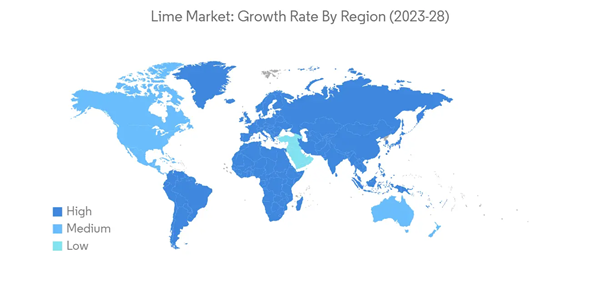Dublin, Oct. 31, 2023 (GLOBE NEWSWIRE) -- The "Lime Market Size & Share Analysis: Growth Trends & Forecasts (2023-2028)" report has been added to ResearchAndMarkets.com's offering.
The Global Lime Market, estimated at USD 41.44 billion in 2023, is poised to reach USD 46.2 billion by 2028, experiencing a compound annual growth rate (CAGR) of 2.2% during the forecast period from 2023 to 2028. This market's growth is fueled by various factors and trends that make lime a versatile and in-demand commodity.
Key Highlights
The utilization of lime extends far beyond its role as a simple fruit. It serves as a crucial ingredient in the production of citric acid, lime oil, lime juice, and other products, finding applications not only in household food items but also in various chores. The rising demand for these products is a significant driver for the lime market. Furthermore, the increasing interest in the health benefits and cleaning applications associated with lime is a powerful force propelling market growth.
India stands out as one of the largest lime producers globally, contributing 3.5 million metric tons to the market in 2021. The lime cultivation area in India reached 322,000 hectares in 2020 and increased to 327,000 hectares in 2021. Despite its prominent position in lime production, India's presence in the processing market remains limited, as most of the produced limes are consumed as fruits. However, a portion of the production finds its way into the food, cosmetics, and pharmaceutical industries. Both the flavor and fragrance processing sectors exhibit a demand for lime within India.
Lime Market Trends
Caters to Various Industries
Lime emerges as a key raw ingredient in numerous food processing and industrial applications. Industries such as pickles, juice processing, cosmetics, essential oils, pharmaceuticals, cleaning, agriculture, and energy consistently source lime from producers. Its unique flavor sets it apart from lemons, making it highly sought after for dishes like ceviche, guacamole, and mojitos. Additionally, lime rind contains limonene, an essential oil compound widely used in the cosmetic industry. This versatility has led to increased demand from these industries, spurring lime production. The dynamic nature of lime continues to reveal new applications as researchers explore its potential benefits.
Asia-Pacific Dominates Global Lime Production
Asia-Pacific exerts a dominant presence in global lime production, led by India, which produced 3.5 million metric tons of lime in 2021. China and Thailand follow with 2.6 million and 0.1 million metric tons, respectively. Other countries in the region, including Indonesia, Vietnam, and the Philippines, also contribute significantly to lime production, with lime being a common ingredient in local cuisines.
The forecast for lime fruit production remains promising, driven by increasing demand for lime-based products, favorable climatic conditions for lime cultivation, and government initiatives promoting agricultural growth and food security. In India, the National Agricultural Development Scheme (NADS) launched by the Ministry of Agriculture and Farmers Welfare in 2020-21 offers financial assistance to farmers, including support for lime fruit cultivation.
Among the commercially important citrus fruits grown in India, acid lime or key lime stands out, with local varieties such as Punjab Baramasi, Eureka, Punjab Galgal, PAU Baramasi, Rasraj, Lisbon lime, Lucknow seedless, Pant Lemon, Assam Lemon, Italian Lemon, and Malta lemon. Lime growers in India are increasingly adopting the latest agricultural technologies, reflecting a growing interest and awareness in achieving commercial cultivation success.

In conclusion, the Global Lime Market is on a growth trajectory, driven by its diverse applications across various industries and the significant production contributions from countries like India in the Asia-Pacific region. Lime's unique flavor and versatility make it a sought-after commodity in both the food and non-food sectors, with increasing demand from the cosmetic and pharmaceutical industries. As lime production continues to expand and researchers discover new uses, the market is poised for steady growth in the coming years.
Key Topics Covered
1 INTRODUCTION
1.1 Study Assumptions and Market Definition
1.2 Scope of the Study
2 RESEARCH METHODOLOGY
3 EXECUTIVE SUMMARY
4 MARKET DYNAMICS
4.1 Market Overview
4.2 Market Drivers
4.3 Market Restraints
4.4 Value Chain/Supply Chain Analysis
5 MARKET SEGMENTATION
5.1 Geography (Production Analysis, Consumption Analysis by Value and Volume, Import Analysis by Value and Volume, Export Analysis by Value and Volume, and Price Trend Analysis)
5.1.1 North America
5.1.1.1 United States
5.1.1.2 Canada
5.1.1.3 Mexico
5.1.2 Europe
5.1.2.1 Spain
5.1.2.2 Italy
5.1.2.3 France
5.1.3 Asia-Pacific
5.1.3.1 China
5.1.3.2 India
5.1.3.3 Thailand
5.1.4 South America
5.1.4.1 Brazil
5.1.4.2 Argentina
5.1.5 Africa
5.1.5.1 South Africa
5.1.5.2 Egypt
5.1.5.3 Sudan
5.1.5.4 Algeria
5.1.5.5 Tunisia
6 MARKET OPPORTUNITIES AND FUTURE TRENDS
For more information about this report visit https://www.researchandmarkets.com/r/8tisua
About ResearchAndMarkets.com
ResearchAndMarkets.com is the world's leading source for international market research reports and market data. We provide you with the latest data on international and regional markets, key industries, the top companies, new products and the latest trends.
Attachment
